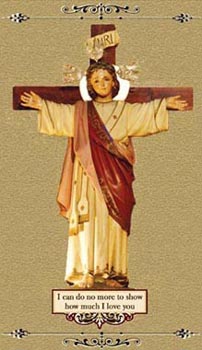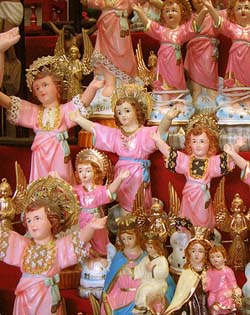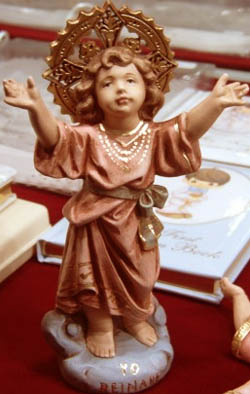 |
What People Are Asking
Are There Statues of the Christ Child
of Pichincha?
 |

To purchase, click here |
Dear TIA,
I had previously purchased from Tradition in Action the prayer card of the Christ Child crucified on Pichincha Mountain. It is such a lovely portrait and your website with pictures is fantastic.
Does TIA have for sale (or consider for the future) a small statue of the Christ Child crucified? I know that it would make a lovely addition to my devotional area. Or do you know of someone who sells a statue of this particular devotion?
Thank you very much for your assistance, and I am,
Sincerely yours,
C.C.

Dr. Horvat responds:
Dear Mrs. C.C.,
The statue of the Christ Child crucified on Pichincha Mountain is truly a very serious and moving one. We do not know of any available statue specifically with this title or spirit. It is a pity that the current piety is not inclined to reproduce the Divine Infant Crucified, as was His wish. The only statues one can readily find are those of the Christ Child with His arms open, giving the impression that He is ready only to embrace us, rather than to suffer for us by being crucified.
You can find various sentimental mass-produced statues of the Christ child, but they do not have the seriousness of the one you referred to.

Nino Divino statues are common. |
For example, if you search with the words Nino Divino on the Internet, you will find many statues of varying size and quality. This particular statue represents one of the most popular devotions in Colombia. At the base of the statue are the words “Yo reinaré” – I will reign! It is a proclamation of Our Lord’s desire to establish His kingship on earth, just as we pray in the Our Father – “on earth as it is in Heaven.”
This particular devotion started in 1917 in Bogotá, Colombia. A Salesian priest, Fr. John del Rizzo, had the first statue made and then spent his life propagating devotion to the Child Jesus. Many miracles and favors were worked through the intercession of the Divino Niño, and the devotion spread into other countries in South America.
We believe that many of these statues are contaminated with the sentimental piety that leads to representing the Divine Infant like a silly child, without wisdom. Such representations should not be promoted because they induce people to venerate/adore someone different from the Word Incarnate. We are certain that Our Lord, since the first moment of His human life, reflected both of His natures – the human and the divine. Many artists have produced an amiable statue that looks more like a doll, which leads us to imagine Our Lord without His Divinity. We are not enthusiasts of this iconography.
To the contrary the reproduction of the Child of Mount Pichincha has both aspects reproduced in a very appropriate way.
A source of hold inspirations
The Divino Nino devotion - as well as others in Europe - would seem to have a direct connection to the vision of the Christ Jesus Crucified on Mount Pichincha to Mother Mariana de Jesus Torres in 1628. Our Lady herself instructed Mother Mariana to have pictures made of the Christ Child Crucified, exactly as she saw him on Mount Pichincha, and to have these words printed on them: “I can do no more to show My love for you.”

A typical statue representing Christ without a trace of His Divinity |
Then the Blessed Mary told her that these pictures would spread all over the world and would be the source of holy inspirations.
Mother Mariana went to the Bishop, the Most Rev. Pedro de Oviedo, Quito’s 10th Bishop, to ask the necessary permission to have the pictures made. He agreed, for Our Lady had enlightened his spirit to see the great good this devotion would do. Actually, the night before he had a dream in which he foresaw the devotion to the Crucified Child on Mount Pichincha. He noted: “I had the impression that these pictures would never be lost; on the contrary, they would be continuously reproduced and have the grace of winning hearts to love God” (The Admirable Life of Mother Mariana, vol. 2, pp. 159 -162).
When the pictures were made, the Bishop himself distributed them to all the religious of the Convent and to various priests and religious, convinced that it would merit him great public and private good during his government.
In fact, everything happened as prophesized. With time variations of this devotion spread throughout Europe and the New World. They have been – and continue to be - the source of holy inspirations, just as Our Lady had promised.
Today, more than three and a half centuries later, the origin of the devotion is becoming known.
I hope this information somehow help you to increase his devotion to Him.
Cordially,
Marian T. Horvat

Posted May 8, 2009

Related Topics of Interest
 Prophecies of Our Lady of Good Success Prophecies of Our Lady of Good Success
 Questions about Our Lady of Good Success Questions about Our Lady of Good Success
 The Child Jesus Crucified on Pichincha Mountain The Child Jesus Crucified on Pichincha Mountain
 A Soldier Converts A Soldier Converts
 Fourth Apparition of Our Lady of Good Success Fourth Apparition of Our Lady of Good Success
 Novena - Short and Long Novena - Short and Long

Related Works of Interest
|
|
Questions | Objections | Comments | Home | Books | CDs | Search | Contact Us | Donate

© 2002- Tradition in Action, Inc. All Rights Reserved
|
 |
|